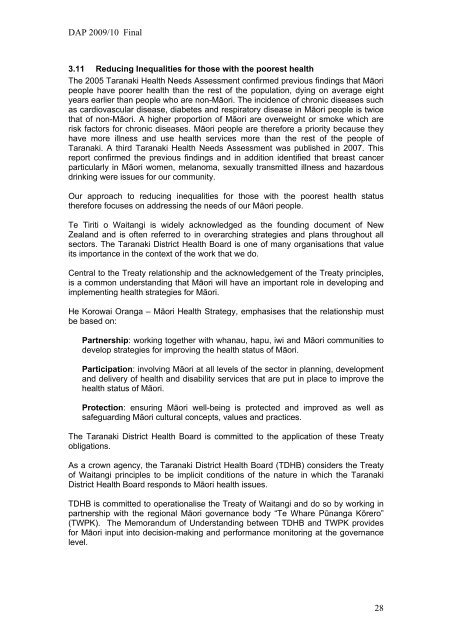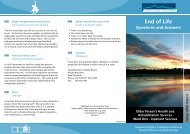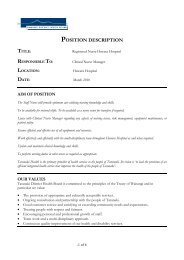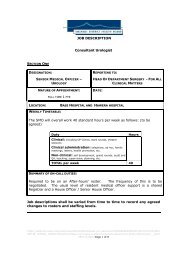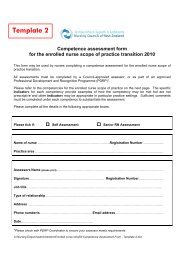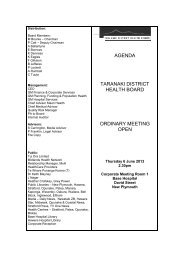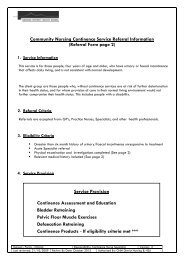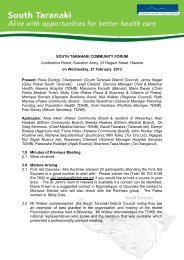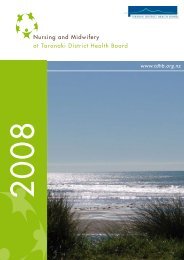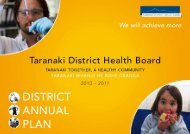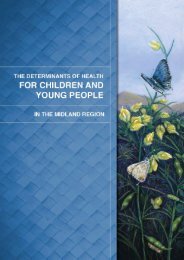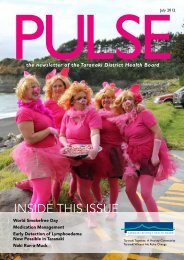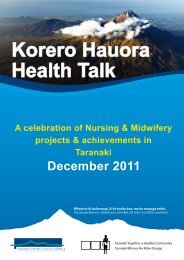DAP 2009/10 Final 1 - Taranaki District Health Board
DAP 2009/10 Final 1 - Taranaki District Health Board
DAP 2009/10 Final 1 - Taranaki District Health Board
You also want an ePaper? Increase the reach of your titles
YUMPU automatically turns print PDFs into web optimized ePapers that Google loves.
<strong>DAP</strong> <strong>2009</strong>/<strong>10</strong> <strong>Final</strong>3.11 Reducing Inequalities for those with the poorest healthThe 2005 <strong>Taranaki</strong> <strong>Health</strong> Needs Assessment confirmed previous findings that Māoripeople have poorer health than the rest of the population, dying on average eightyears earlier than people who are non-Māori. The incidence of chronic diseases suchas cardiovascular disease, diabetes and respiratory disease in Māori people is twicethat of non-Māori. A higher proportion of Māori are overweight or smoke which arerisk factors for chronic diseases. Māori people are therefore a priority because theyhave more illness and use health services more than the rest of the people of<strong>Taranaki</strong>. A third <strong>Taranaki</strong> <strong>Health</strong> Needs Assessment was published in 2007. Thisreport confirmed the previous findings and in addition identified that breast cancerparticularly in Māori women, melanoma, sexually transmitted illness and hazardousdrinking were issues for our community.Our approach to reducing inequalities for those with the poorest health statustherefore focuses on addressing the needs of our Māori people.Te Tiriti o Waitangi is widely acknowledged as the founding document of NewZealand and is often referred to in overarching strategies and plans throughout allsectors. The <strong>Taranaki</strong> <strong>District</strong> <strong>Health</strong> <strong>Board</strong> is one of many organisations that valueits importance in the context of the work that we do.Central to the Treaty relationship and the acknowledgement of the Treaty principles,is a common understanding that Māori will have an important role in developing andimplementing health strategies for Māori.He Korowai Oranga – Māori <strong>Health</strong> Strategy, emphasises that the relationship mustbe based on:Partnership: working together with whanau, hapu, iwi and Māori communities todevelop strategies for improving the health status of Māori.Participation: involving Māori at all levels of the sector in planning, developmentand delivery of health and disability services that are put in place to improve thehealth status of Māori.Protection: ensuring Māori well-being is protected and improved as well assafeguarding Māori cultural concepts, values and practices.The <strong>Taranaki</strong> <strong>District</strong> <strong>Health</strong> <strong>Board</strong> is committed to the application of these Treatyobligations.As a crown agency, the <strong>Taranaki</strong> <strong>District</strong> <strong>Health</strong> <strong>Board</strong> (TDHB) considers the Treatyof Waitangi principles to be implicit conditions of the nature in which the <strong>Taranaki</strong><strong>District</strong> <strong>Health</strong> <strong>Board</strong> responds to Māori health issues.TDHB is committed to operationalise the Treaty of Waitangi and do so by working inpartnership with the regional Māori governance body “Te Whare Pūnanga Kōrero”(TWPK). The Memorandum of Understanding between TDHB and TWPK providesfor Māori input into decision-making and performance monitoring at the governancelevel.28


